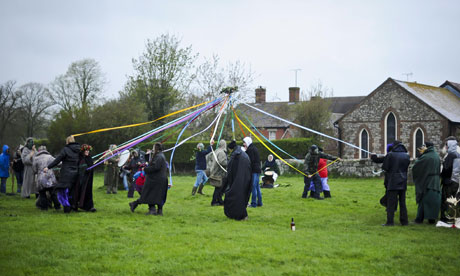
Last month it was suggested that Cornish schools should study paganism in religious education. This modest proposal provoked a splenetic and histrionic reaction from Cristina Odone, in the Daily Telegraph. She seems to be under the impression that the schools' new remit is to "teach witchcraft and druidry". For an exciting moment, I had a vision of Hogwarts' latest Ofsted inspection proving inspirational to Cornish educational authorities, with parents in Truro and Penzance being sent appropriate memos for their children's latest classes ("Please supply: cauldron x 1, athame x 1, candles x 4. Child must bring own goat.")
"How long," Odone asks, working herself up to a tirade which one can only hope is tongue-in-cheek, "before the end of term is marked by a black mass, with only health and safety preventing a human sacrifice?"
One is tempted to reply that it would have enlivened one's schooldays considerably: the prospect of Smythe minor being bloodily slaughtered in appeasement of Satan would, I feel, have been a memorable end to the academic year. However, quite apart from the fact that there are only a handful of practising satanists in this country and most of them are erudite and law-abiding folk who espouse a kind of Nietzschean self-development rather than full-on goat massacring, satanism has nothing to do with wicca, which regards the devil as a purely Christian concept, and even less to do with modern druidry.
Hysteria aside, schools in Cornwall obviously have no intention of going down the Hogwarts route: the whole purpose of RE is, or should be, to instruct pupils about a range of beliefs, not to teach them actual practices. Most of the responses to Odone's piece fell into two categories: either from practicing deists of a variety of faiths who felt, commendably, that if you're going to look at contemporary religions in the UK, you may as well include paganism, which is on the rise, and agnostics/atheists who took the view that it might well be rubbish, but you need to instruct children as to what other people believe so that they will recognise nonsense when they see it. There was a scattering of Christians who feel that it is all evil, and that the mere prospect of examining witchcraft as a contemporary movement will cause demons to flock through the cracks of your infant's cot, and at the other extreme, a handful of atheists who – oh wait, same view, really, only somewhat more metaphorical. But no set of beliefs has a monopoly on people who are inextricably wedded to the notion of their own rightness.
Just so that we are clear on this, I am in favour of teaching children about different beliefs. I am not in favour of indoctrinating them in any particular belief, including my own: these issues should be presented as beliefs, not as fact. I don't agree with teaching creationism as theory (it isn't: it's a belief) and would not agree with it even if modern paganism had any creation myths of its own (we're cool with the whole evolution thing). I think that science should stay firmly where it is within the school curriculum. The actual proposal to Cornish schools refers to an examination of paganism in its historical and archaeological context, involving comparisons with how it is currently practised.
A central part of Odone's article relates to morality: she appears to feel that this is peculiar to her own faith, and that everyone else is wallowing in some kind of self-indulgent postmodern relativism. Given that Emma Restall Orr, the person she most criticises during the course of the article, has probably done more than anyone to explore just what pagan ethics might mean, this is tedious, quite apart from any issue of the lamentable record of the Catholic church of late in applying its precepts to its personnel. It's also somewhat ironic that on a quick Google search, I discovered a recent article by Odone which rails against the high cost of the Harry Potter experience. Ahem.
Since the same set of linked articles also features a paean to Somerset cider, I emailed Odone and invited her for a pint: we're a tolerant lot down here. I have not had a response, which does not entirely surprise me: Odone's article – with its mixture of kneejerk panic, ignorance and ad feminam attacks – demonstrates that the concept of freedom of religion means, for some people, "freedom for my religion" alone.
• Follow Comment is free on Twitter @commentisfree

